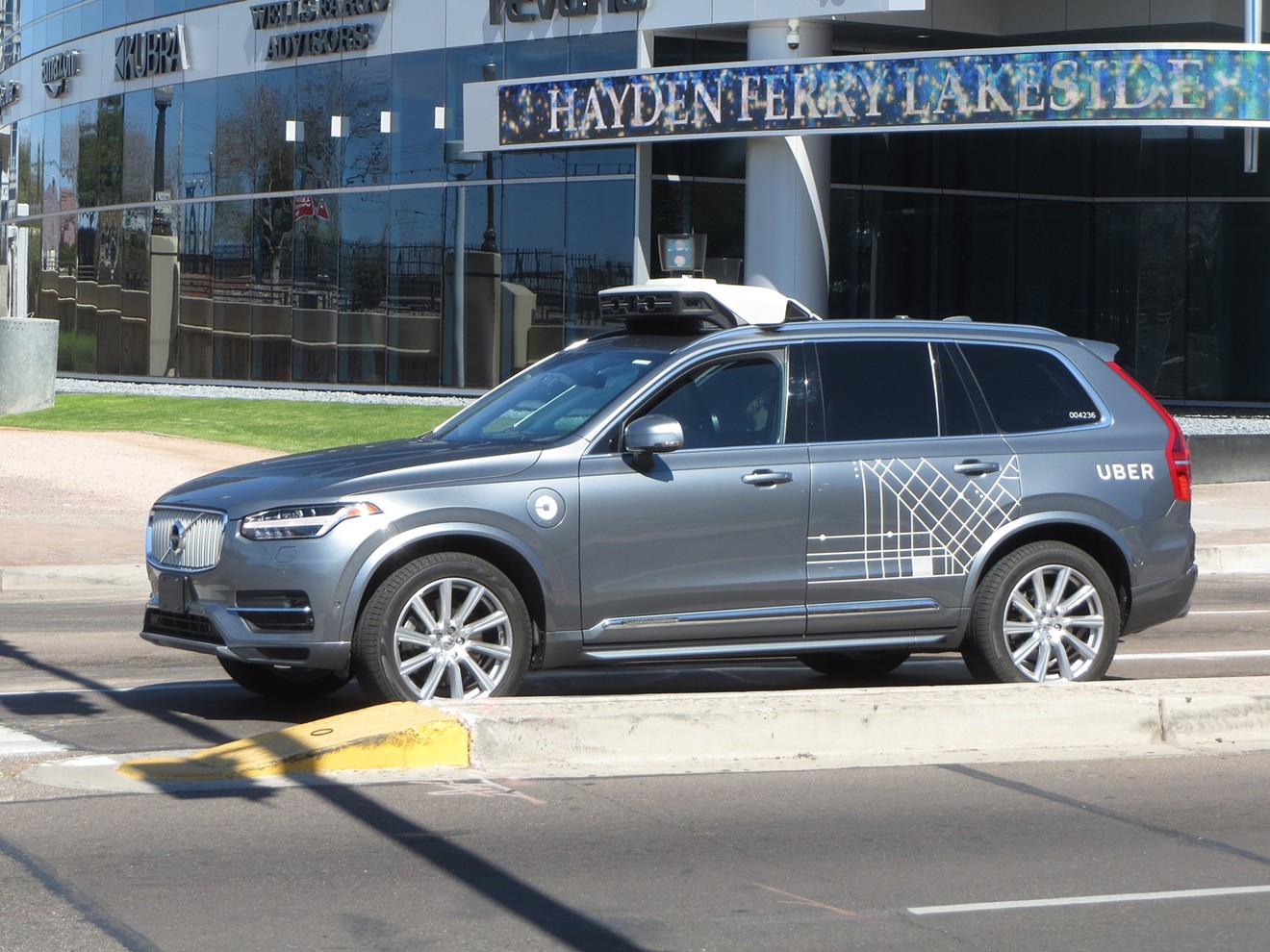Arizona Governor Doug Ducey ended the era of unfettered self-driving car companies last week, creating a detailed system of rules and a type of licensing system for the vehicles.
Ducey's new executive order is being described as an "update" of his permissive 2015 order that resulted in a fleet of hundreds of semi-autonomous cars on state roads. White Waymo and gray Uber vehicles, bristling with cameras and antennas, have become a common sight in Tempe and Chandler. The state is now considered a leader in the technology, though the dry, warm climate and other factors have attracted the firms.
"The technology has advanced considerably, and the industry has grown rapidly," said Kirk Adams, Ducey's chief of staff. "The companies still have work to do, certainly from a public understanding of the technology. That's their job. Our job is to make sure that we are protecting public safety."
Officials were never that clear about any limitations of the 2015 order. The March 1 rules follow several news articles, including in Phoenix New Times, that posed questions about the liabilities and lack of rules for the vehicles already being tested.
According to Ducey's staff, officials were also motivated after the federal government published guidelines for the vehicles last fall.
Under the new order, companies must register their vehicles with the state if they intend to put driverless cars on the road, and do it within 60 days if they've already begun such testing. They have to follow rules, such as displaying federal certification labels and making sure the vehicle will stop automatically or take other safety actions in case the self-driving function fails.
If the companies comply, they'll be considered "licensed to operate the vehicle" under state transportation law, the order says.
The Arizona Department of Public Safety has to come up with a plan for law -enforcement agencies across the state on how to deal with the rapidly breeding robocars.
DPS should educate "relevant law-enforcement agencies and other first responders on how to interact with fully autonomous vehicles in emergency and traffic enforcement situations, contact information for insurance and citation purposes, and any other information needed to ensure the safe operation of fully autonomous vehicles in Arizona," the order states.
Ducey's latest order gives definitions that should help the public better understand what's going on, and how the state will help manage the futuristic technology. Americans remains wary of the concept of fully autonomous vehicles; polls show most people aren't ready to get in one.
The order rolls back some of Ducey's freewheeling policy on self-driving cars.
In December 2016, the state Department of Transportation touted the lack of rules in news release about Uber's decision to test its vehicles in Arizona:
"Part of what makes Arizona an ideal place for Uber and other companies to test autonomous vehicle technology is that there are no special permits or licensing required," the ADOT release said. "In Arizona, autonomous vehicles have the same registration requirements as any other vehicle, and nothing in state law prevents testing autonomous vehicles."
Under Ducey's new order, if the "person," or company, fails to submit a written statement that a vehicle adheres to all of the new rules, the ADOT director "has the authority to immediately issue a cease and desist letter revoking any permissions to operate a fully autonomous vehicle on Arizona's public roads ..."
Adams said the last 12 to 18 months have seen astonishing progress, and more miles driven by the test vehicles. Then, in the fall, the National Highway Traffic Safety Administration issued guidelines that became a "seminal moment in the industry," he explained.
"We felt it was time to react and be consistent with those guidelines," he said.
The 2017 NHTSA guidelines, released in September, call for an application process and other measures similar to what the state now requires. The federal agency's 2016 guidelines on "highly automated vehicles" suggested the same thing.
The governor created a self-driving car oversight committee staffed with representatives of ADOT, the state Department of Insurance, Ducey's office, and the University of Arizona, and given a mission to advise state agencies and universities on how to best advance self-driving cars. The board met once, online records show, or perhaps twice, and did little else.
The head of the insurance department told the New York Times for a November article that he would "wait for the insurance industry to guide regulators on liability policies for driverless cars, amid questions about who is responsible in a crash if the car isn’t driven by a human."
"At this point, you just need to be a registered, insured vehicle just like anybody else,” said Kevin Biesty, deputy director for policy at the Arizona Department of Transportation told the Arizona Republic in June.
Chandler police Lieutenant David Ramer told New Times in October there was "no protocol in place" for coping with driverless vehicles.
In 2017, Chandler police recorded three accidents involving semi-autonomous vehicles, one of which was deemed at fault in an illegal left turn. But that vehicle had a driver.
So far, most, if not all, of the vehicles being tested on metro Phoenix roads aren't true autonomous vehicles, or self-driving — though such terms fit well in headlines. In fact, the Uber and Waymo vehicles have drivers, and the self-driving technology enhances the abilities of those drivers. No doubt, that's why few crashes have yet occurred.
For competitive reasons, the companies don't want to release how many miles the vehicles go before requiring human intervention. But once the vehicles go "fully autonomous," things could change. Even if they drive more safely than most human beings, they could still cause serious damage, or worse, injure or kill someone.
Adams and Ducey spokesman Daniel Scarpinato, in response to questions from New Times, said the state would not be liable if a fully autonomous vehicle being tested on Arizona roads negligently killed someone, despite the state's advocacy of the vehicles.
The corporation that operates the vehicles would be responsible, they said, and the company could be held criminally liable just like a person.
As the new executive order states, a "person" is defined as including corporations under state law. The company would also pay any traffic tickets the driverless vehicle may incur, they said.
"The governor cares about this," Scarpinato said, adding that the technology has the potential to save thousands of lives. "It holds a lot of promise."
Uber ignored specific questions about Ducey's decision and released a general statement to New Times: "Since his first days in office, Governor Ducey has made innovation one of his top priorities. Arizona continues to lead the way when it comes to embracing ridesharing and new technologies. We look forward to continuing our development and testing in Arizona to promote the safe deployment of self-driving vehicles."
Uber's competitor, Waymo, also praised Ducey for promoting the vehicles.
"Arizona's support of innovation has allowed Waymo to remain focused on our mission to improve road safety by building the world's most experienced driver," Waymo spokeswoman Amanda Venture said. "We are proud to be growing our operations in Chandler and look forward to launching our driverless ride-hailing service in the Greater Phoenix area later this year."
[
{
"name": "Air - MediumRectangle - Inline Content - Mobile Display Size",
"component": "18478561",
"insertPoint": "2",
"requiredCountToDisplay": "2"
},{
"name": "Editor Picks",
"component": "16759093",
"insertPoint": "4",
"requiredCountToDisplay": "1"
},{
"name": "Inline Links",
"component": "17980324",
"insertPoint": "8th",
"startingPoint": 8,
"requiredCountToDisplay": "7",
"maxInsertions": 25
},{
"name": "Air - MediumRectangle - Combo - Inline Content",
"component": "16759092",
"insertPoint": "8th",
"startingPoint": 8,
"requiredCountToDisplay": "7",
"maxInsertions": 25
},{
"name": "Inline Links",
"component": "17980324",
"insertPoint": "8th",
"startingPoint": 12,
"requiredCountToDisplay": "11",
"maxInsertions": 24
},{
"name": "Air - Leaderboard Tower - Combo - Inline Content",
"component": "16759094",
"insertPoint": "8th",
"startingPoint": 12,
"requiredCountToDisplay": "11",
"maxInsertions": 24
}
]














